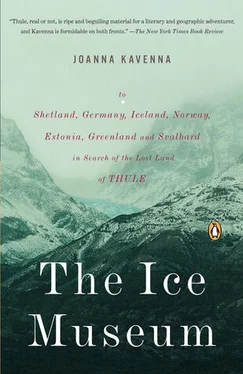A door opened, a white-haired secretarial head appeared, wearing a tired expression, and an arthritic hand gestured me into the room. The light was dim; a heavy writing desk squatted in the centre. Dwarfed by the desk was the fossilized scholar, slouched on a chair, wearing a tattered suit. He shook hands, but he stayed on his chair, and he murmured so softly I could barely hear him. Andrew was a patched-up relic, living off his early research. The walls were covered with shelves, the shelves strewn with books and files, the desk crowded with papers. It all looked staged, like a film set, and Andrew looked as if he had been deposited there that morning with instructions not to leave. Andrew had been intrepid many years ago; he had spent a while with the Inuit in the far north of Greenland, at Thule. But the years had battered Andrew into his room and now he slumped behind the desk.
He screwed up his face, and whispered into his collar: ‘In Greenland the fabulous becomes real. Greenland is the meeting of the real and the fabulous. A super-reality, a hyper-existent image of truth and destiny. In Greenland object and subject are elided. In Greenland we ask ourselves what am I? What do I mean?’ And he smiled.
‘In Greenland the stars meander through the heavens, forecasting, predicting the future. Everything swirls—the lights, the snow in the wind, the waves as they wash across the bergs. It is a place both beautiful and ghastly; yes, it is a place of contrasts. Only the flexible of mind can understand this immensity; only the immense of spirit can swirl with the beauty of the stars, the ravenous motions of the wind. Rasmussen named his settlement Thule because he understood immensity.’
Andrew slouched in his chair, his head emerging out of the antique folds of his neck, his hands like leather. His chin was almost under the desk. He talked and talked, without pauses, his voice almost inaudible and unhurried. ‘Imagine what it was like for the Inuit when the Americans arrived in the 1950s. There are books about it, by a Frenchman. I will find them for you.’
He meant a writer called Jean Malaurie, who had written about the Greenlandic Inuit, in books with titles like The Last Kings of Thule . Malaurie had been staying in the first Thule when the Americans arrived. He had gone over to visit the American base, and found snack bars and barracks buildings and a host of courteous soldiers, a cinema, a powerhouse, telephones, a baseball centre, a radio tower, a restaurant and a hospital. He wandered around, over excavations and networks of piping. Back in the village of Thule, he had watched the helicopters and icebreakers, a ‘formidable Armada, ’ bringing more occupants to the base. The ships were filled with ‘bobby-soxers of Thule,’ boys from Harvard and Berkeley, who wanted to see the Arctic by working at the base. They streamed across the ice to the Inuit village, swapping cigarettes, axes and footwear for souvenirs.
‘And do you think—’ I began. Andrew held up his hand.
‘Some of the Inuit thought they would be sent away, some thought the Americans had magical powers to control the weather, to make a constant summer. And people were worried; they thought with the Americans came things like the atomic bomb. Really, they were right on that. The Danish government pretended it was not true, but we know that the Americans kept nuclear weapons at Thule during the Cold War. Without the knowledge of the Inuit, of course. But also I think from what was said at the time that somehow the Inuit felt that their place, their Thule, had always been unusual, and now here was the proof, because the great power of America had found them out, even in the remote north.’
Thule Air Base was established on a barren patch of rock. The creation of a permanent military base at Thule had been approved by President Truman in 1950. The agreement was ratified with Denmark as part of the newly formed NATO defence programme. A NATO area was established, called the Greenland Defence Area. Thule Air Base was constructed in secret under the code name Operation Blue Jay. Construction began in 1951 and was completed two years later. US ships appeared on the Greenlandic coast, bringing thousands of men. The Americans banged out a base: 82 miles of road, in a country with virtually no roads, 10 hangars, 122 barracks, 6 mess halls, a gym, a service club, an officers’ club, library, post office, a bakery, a theatre, a chapel and a hospital. There were warehouses, power plants, heating plants, a thousand-foot pier constructed from barges towed from the Gulf of Mexico.
The US Military stacked up supplies at Thule. They brought in anti-aircraft guns, surface-to-air missiles and nuclear warheads. Thule became a secret place in Greenland; access to the US Military base was forbidden to those without clearance.
In the spring of 1953, the inhabitants of the Greenlandic village of Thule were moved sixty-five miles to the north, to Qaanaaq or the second Thule.
‘And do you think—’ I continued.
‘It was as if the Americans wanted to pluck the secret from the . . . from the . . .’ Andrew lost his train of thought. He picked up a pencil with his gnarled fingers, toyed with it for a moment and then dropped it again.
‘And do you think—’
‘You know, I went in the 1960s, to Thule Air Base.’ Andrew slumped further into his chair, his head pressed so firmly down into his chest that it seemed he would never raise it again. He was almost inaudible as he spoke, and I leaned further across his desk, trying to understand these faint sentences.
‘I was young. You weren’t born, of course.’ He tried to lift his head, but the effort was too great. It dropped down again.
‘By the 1960s, it was a big place. Thousands of soldiers there, waiting for the nuclear war, for Russia to attack. You have no idea of the paranoia that existed. They were spending so much money, so many millions. They had flown everything from America, of course. You don’t find dynamite and metal and vast quantities of wood in the north of Greenland. You don’t find telephones and buses and ha! ha!’—a faint rustling sound was coming from Andrew’s throat, which I identified as a laugh—‘baseball bats. Not many of those in the north of Greenland. Not many such things at all. They brought it all over. They were nicely set up when I saw them. The soldiers seemed happy. You’ll probably find the same, when you go. They even had refrigerators in the houses.’
‘And—’ I interjected. The trembling hand again, like an ancient policeman directing traffic. I raised my voice: ‘And do you think —’
Andrew whispered more insistently. ‘I must say that I think it was really millions and millions that they spent. You know they only had two months when the sea was not frozen, only two months to bring everything through to the base. It was an astonishing feat of organisation.’
He was old and frail, but Andrew knew how to deliver a monologue. He skipped around a little; he wasn’t strictly chronological. But he was determined to finish. I wondered if he was often alone in this room, talking softly to himself, sinking slowly into his chair, waiting for the knock on the door, a reason to draw his head upwards.
‘Yet you could say that there has always been something strange about that base, because of its name, because it became Thule Air Base. It gives a different atmosphere to the place I think. I felt it even when I was there. The American soldiers did not want to know their environment when they arrived. They wanted to sit in their gyms and phone home to their parents. But it seized them. I thought even the most obedient soldier came to be in awe of the vastness of the rocks around them. In this respect they were weaker than the Inuit, who understand the antiquity of the stones. Many people disagree with me,’ Andrew said, spreading his hands on the desk. ‘But I am glad the Inuit kept the name of Thule, so it wasn’t just the Americans who had it.’
Читать дальше












